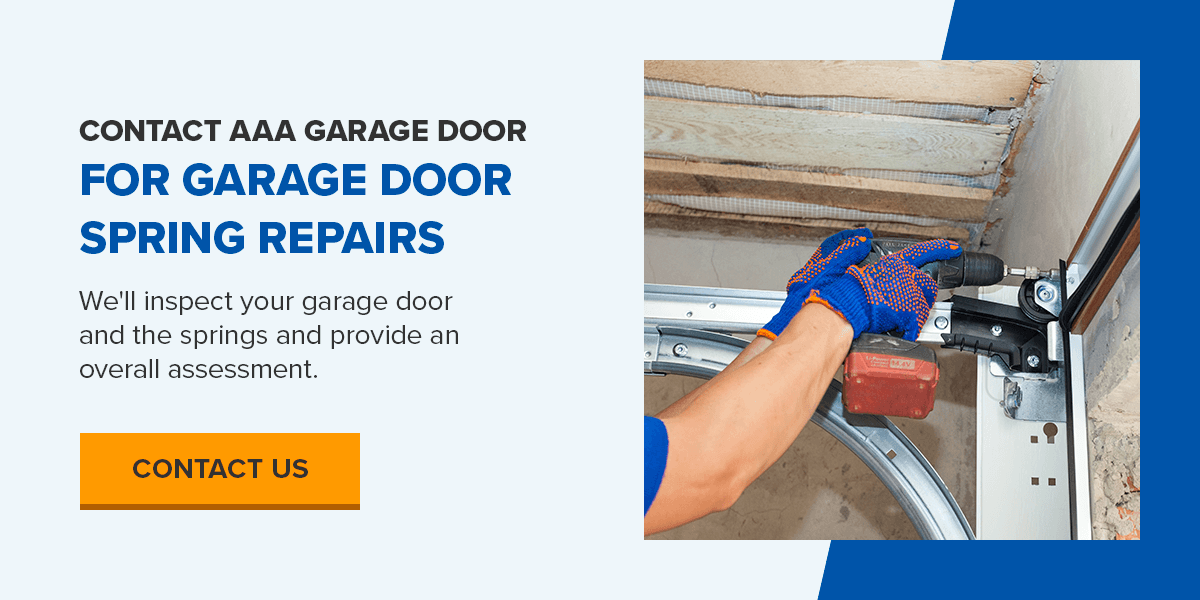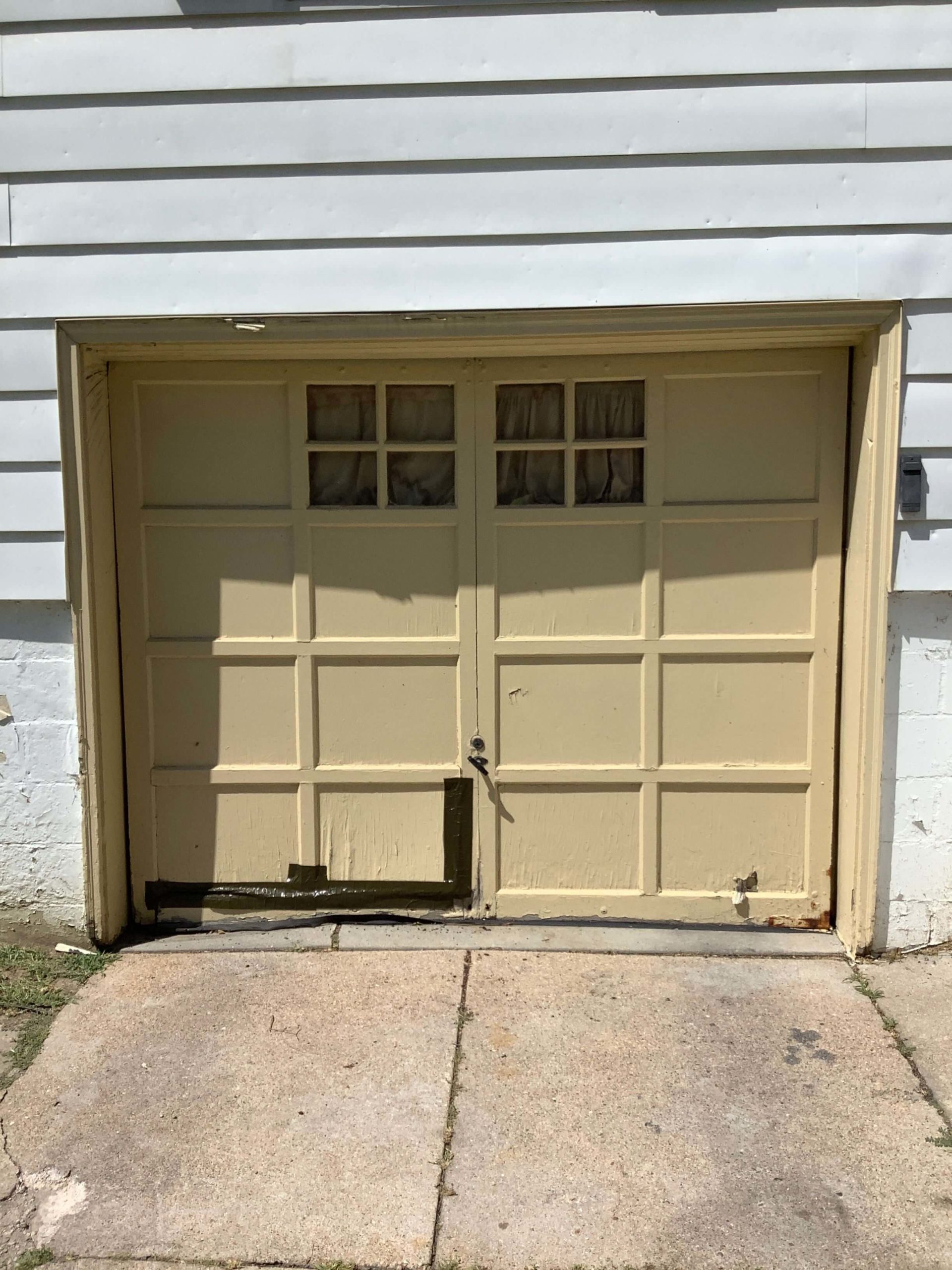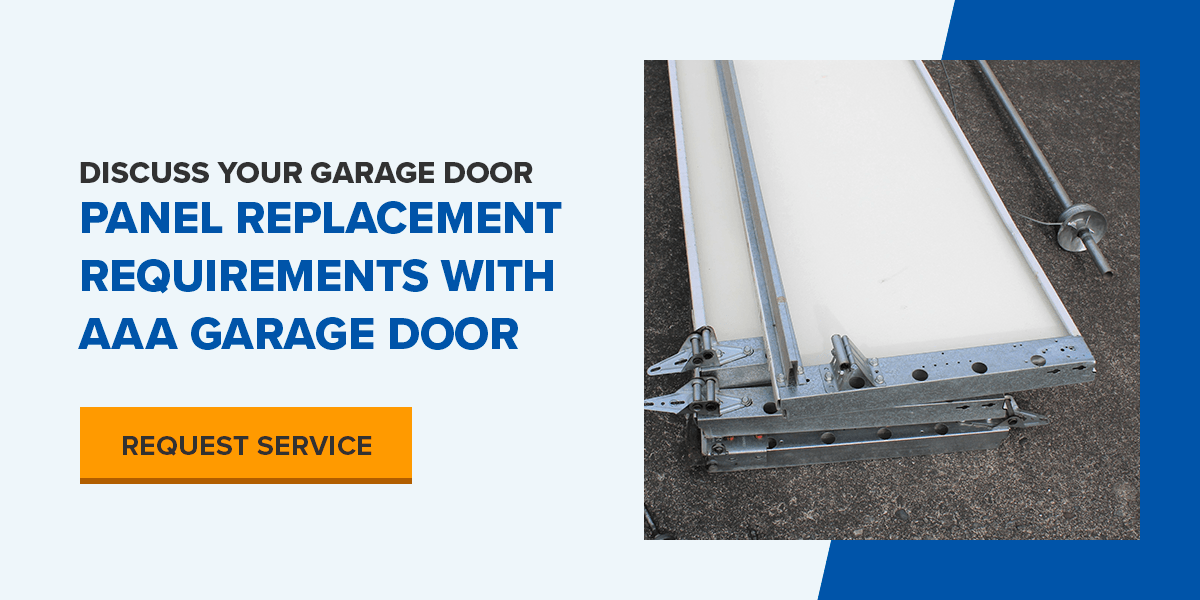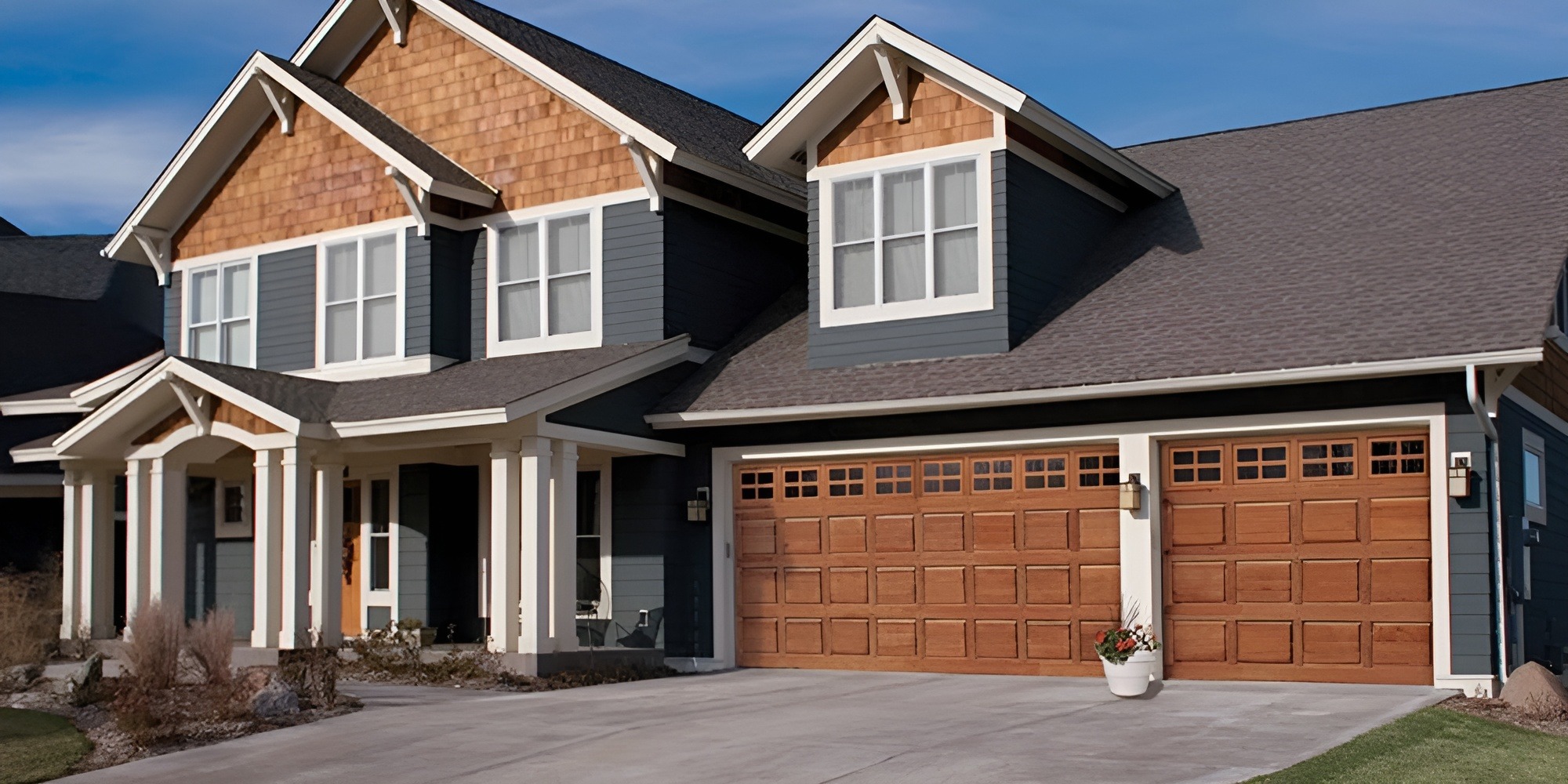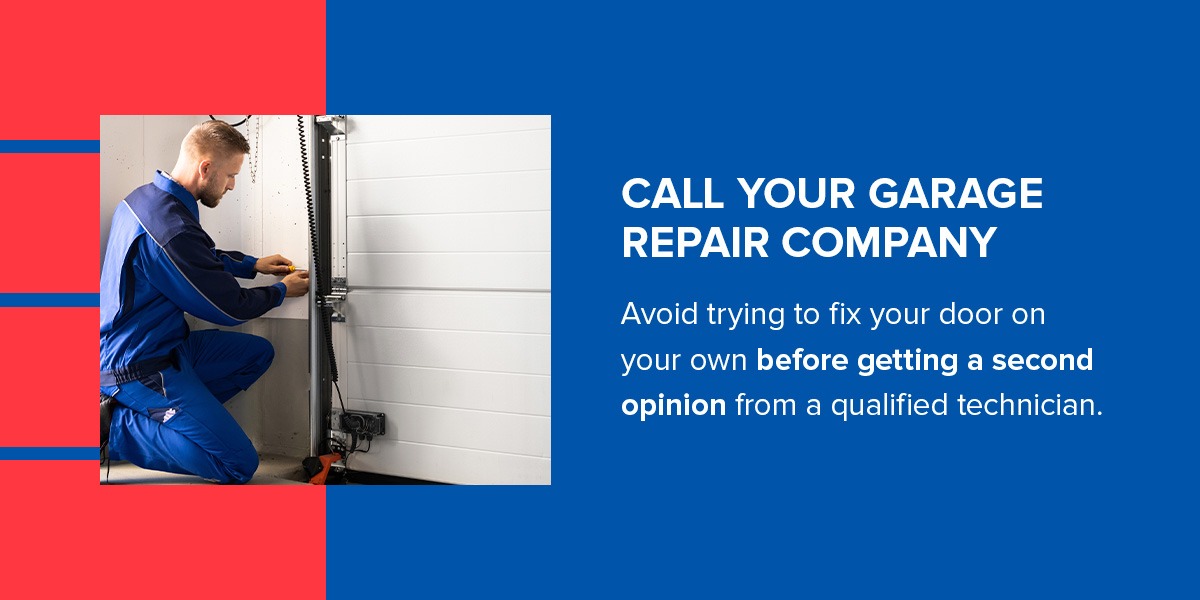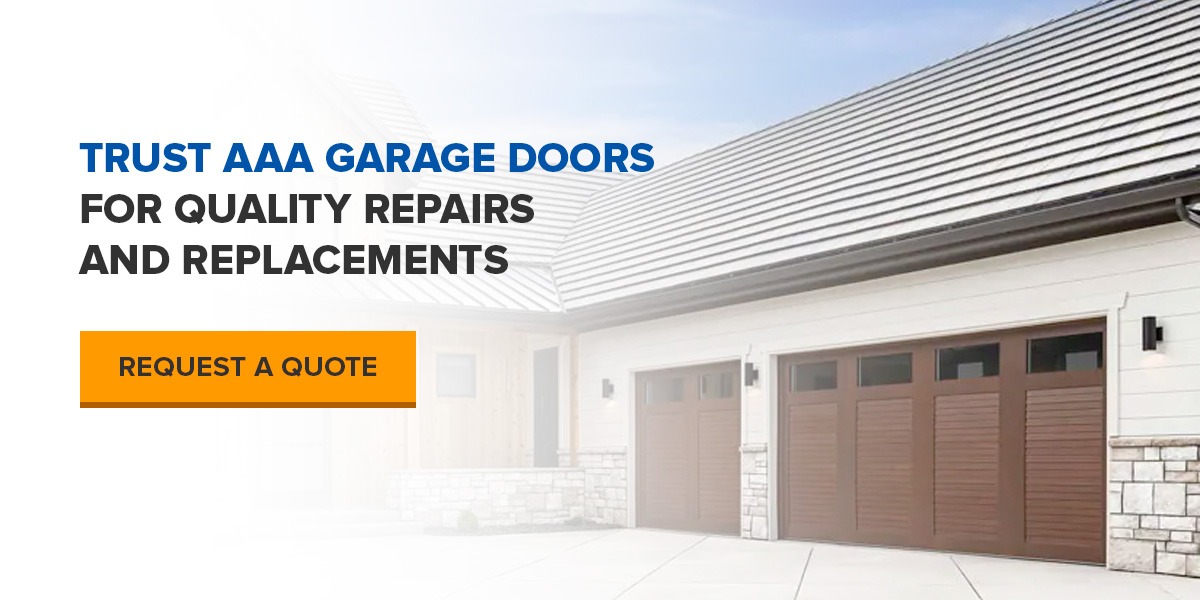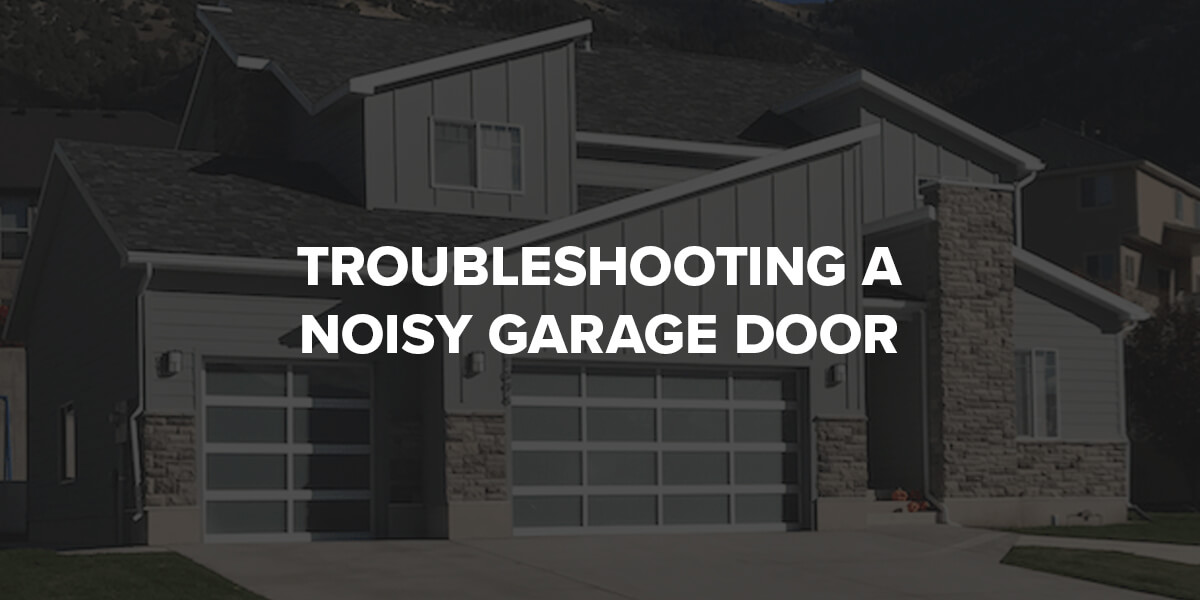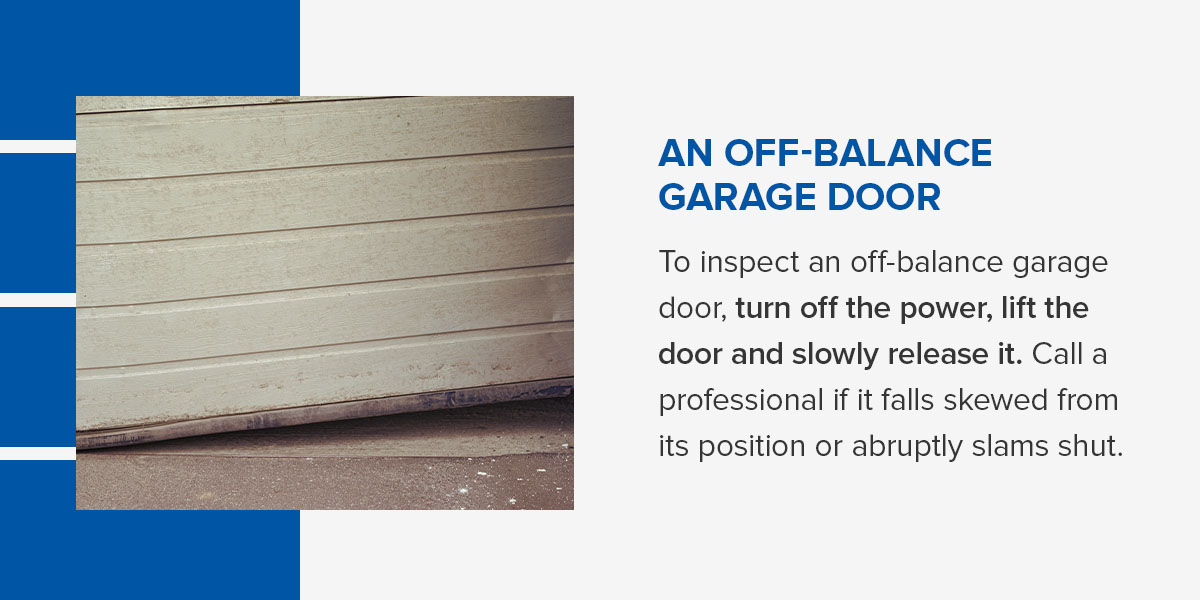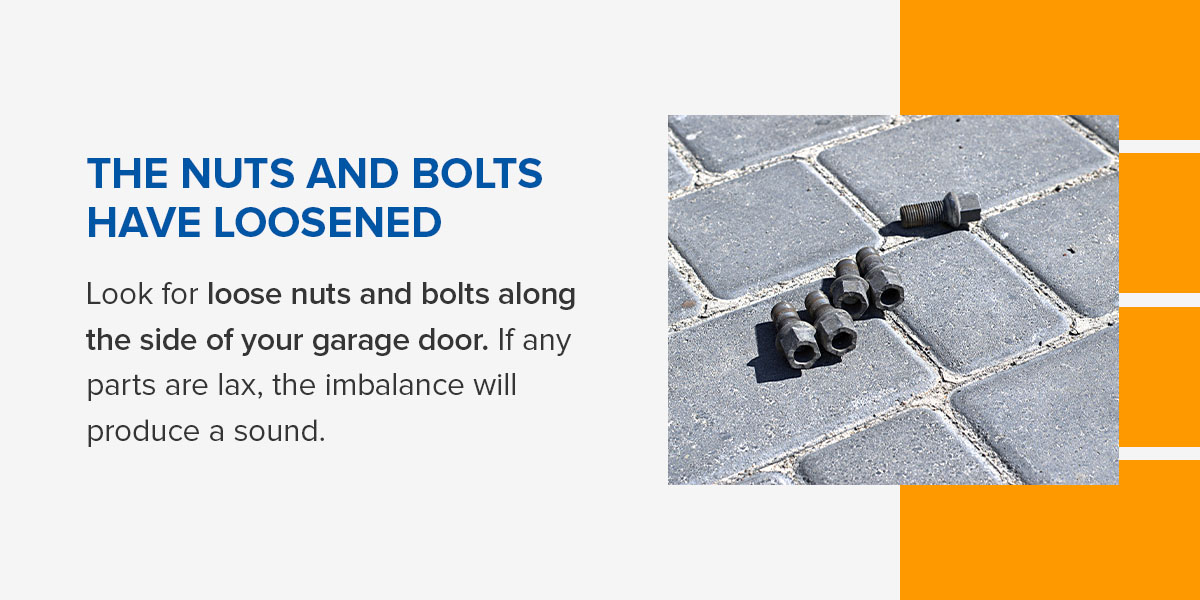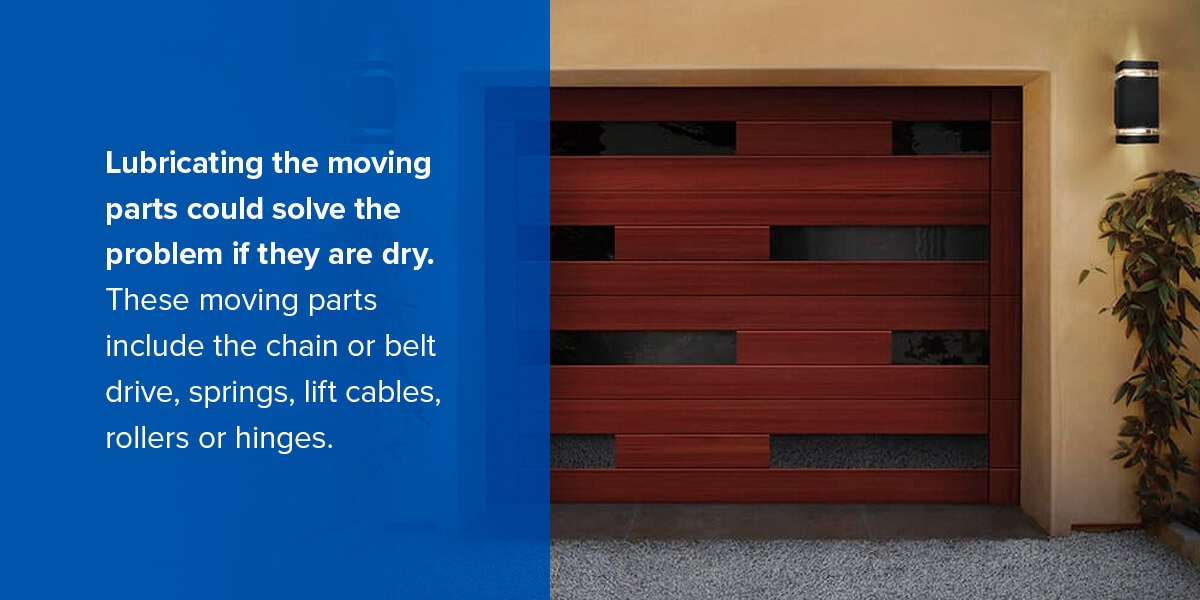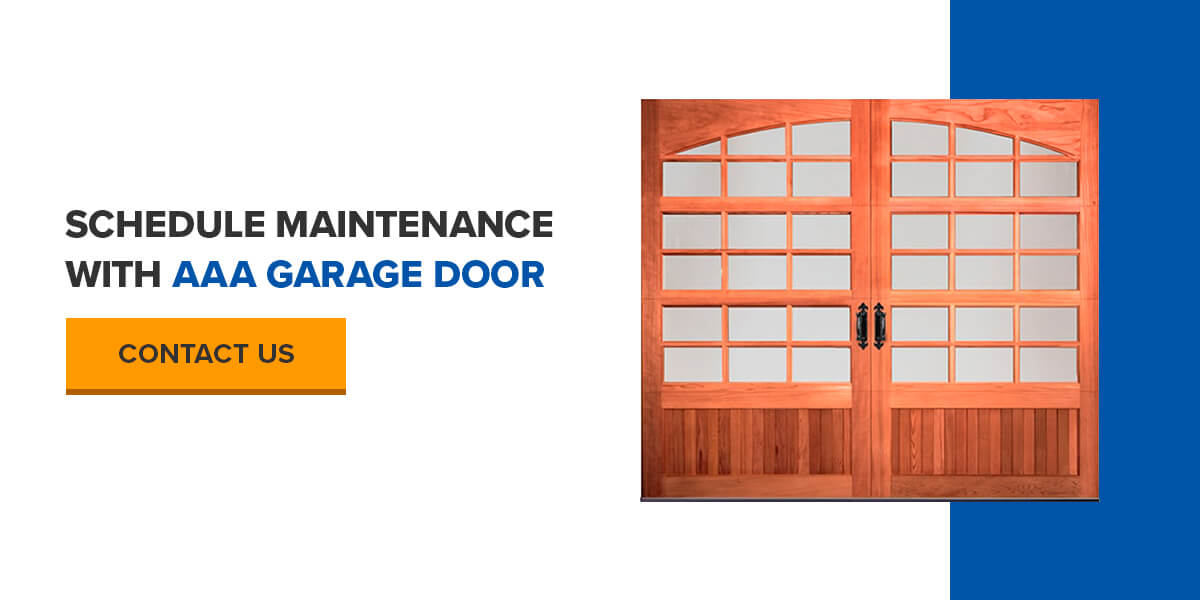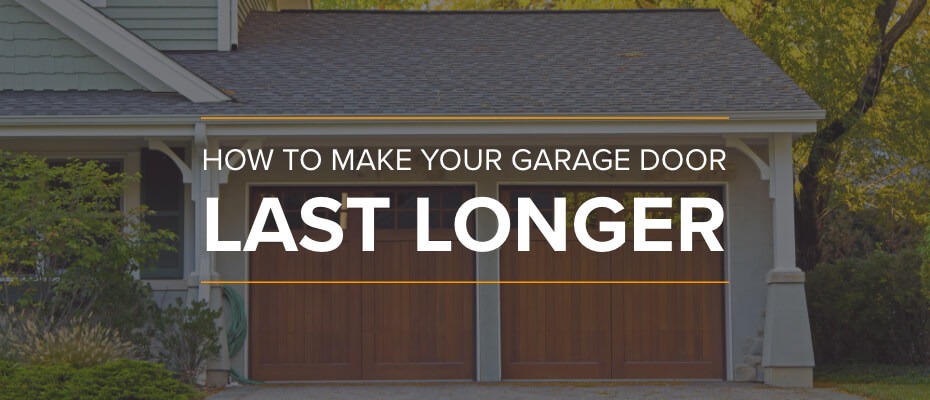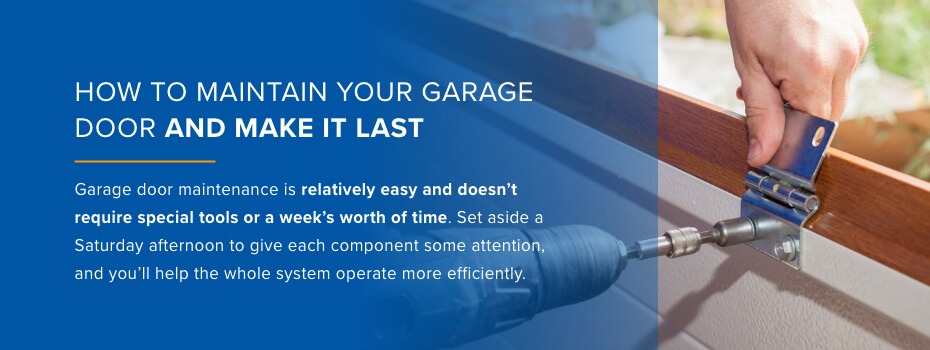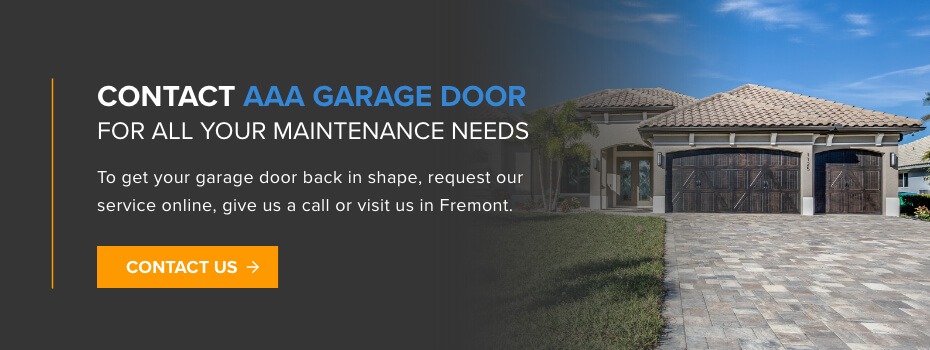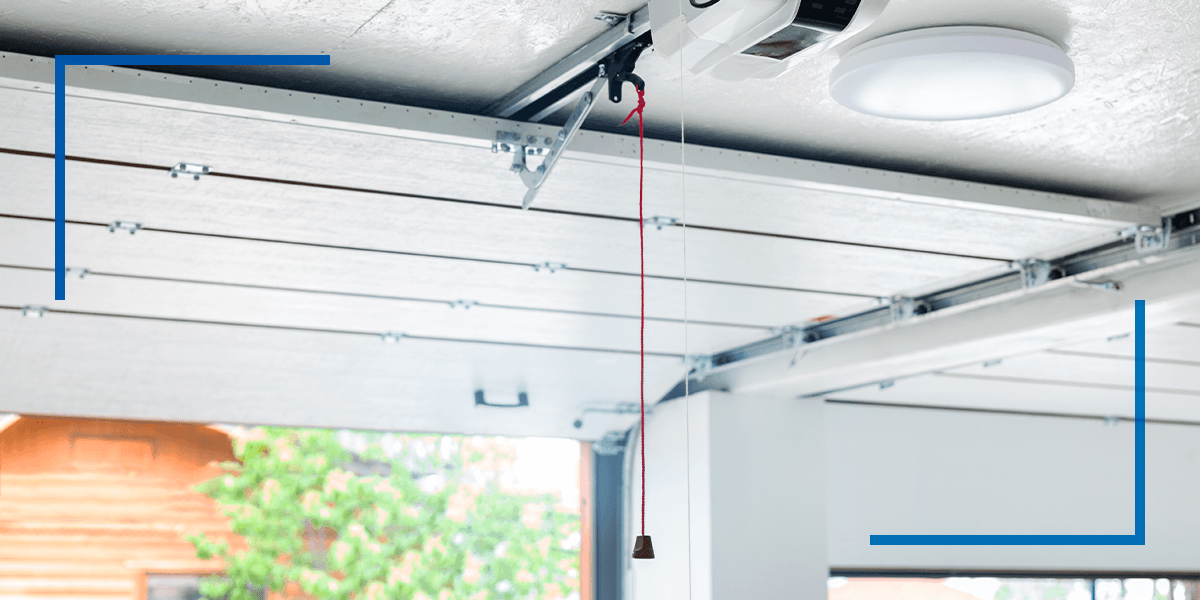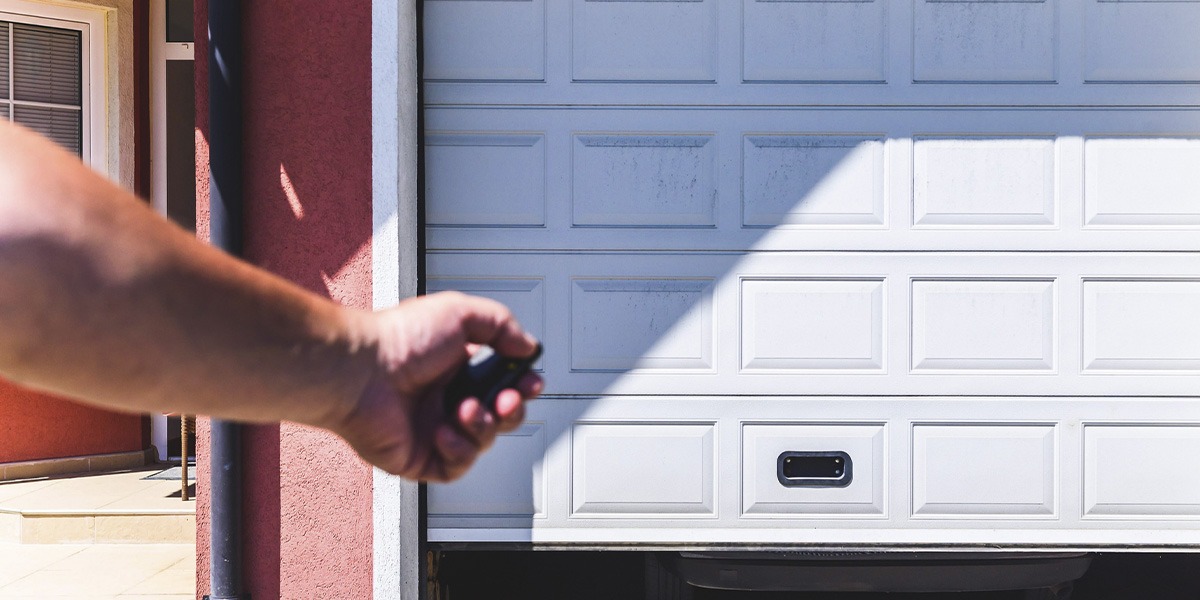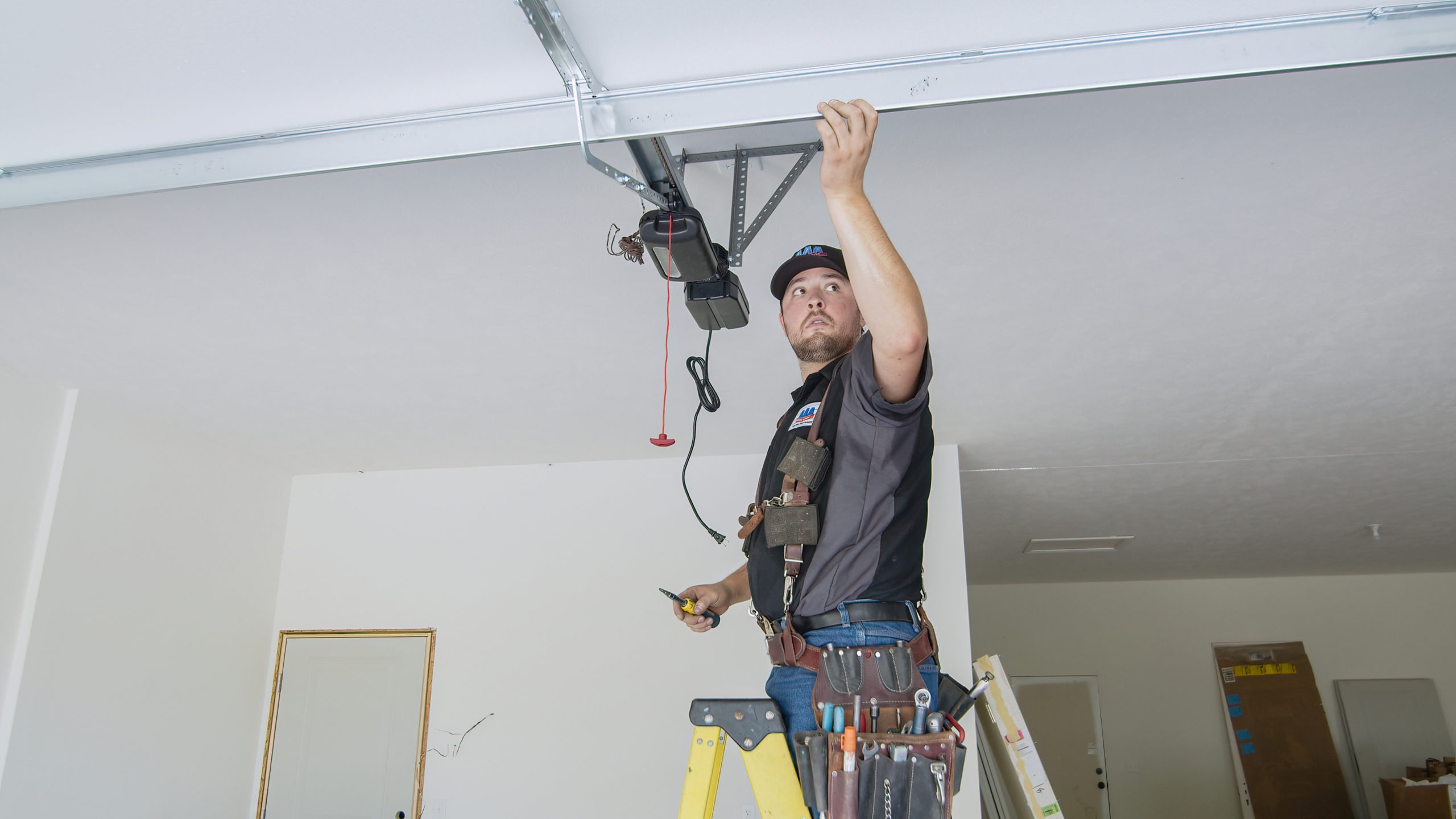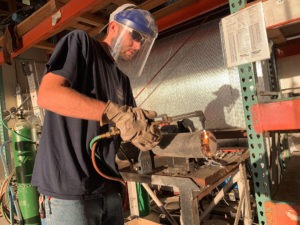Your Guide to Broken Garage Door Springs
Your garage door endures immense strain daily. You rely on it to open and close on demand, whether automatically or manually. With so many moving parts, it will eventually experience wear and tear. Garage door springs are particularly susceptible to breaking because they lift and lower the weighty door frequently.
If you have a broken garage door spring, AAA Garage Door is here to help — starting with this guide.
Types of Garage Door Springs
Garage doors typically have either torsion springs or extension springs. Torsion springs are located above the garage door, and they consist of rotating coils that counterbalance the door’s weight during operation. Extension springs are situated on the sides and counterbalance the garage door’s weight by expanding and contracting when in use.
Both spring types are long-lasting, enduring between 10,000 and 20,000 cycles. Although torsion springs are costlier, they provide double the amount of cycles as extension springs. You might start noticing signs of damage when they reach their end of life.
How to Tell if Your Spring Is Bad or Broken
Failure to open your garage door is a possible indication your spring is faulty or broken. While there may be other reasons it won’t open, you can inspect the spring’s condition by checking it for separation, elongation or stretchiness.
We strongly advise against physically touching or handling garage door springs due to the increased risk of injury and even death. Always consult a professional garage door contractor for help inspecting your springs.
In the meantime, you can check out other signs of bad or broken springs without engaging physically. These include:
- Inspecting components inside the garage: Components such as the pulleys, rollers, cables and springs work together to open and close the door. If any of these parts are damaged, the spring may break under the door’s weight.
- Checking for loss of tension: Springs operate with tension. Sagging and other visible signs of tension loss could indicate worn springs that need replacing.
- Performing a force-setting test: To perform a force-setting test of an automatic door, open it and place an object at the bottom as it slowly closes. The door has a sensor that should reverse upon contact with any object. If the door continues closing and doesn’t reverse to its open position, contact a professional right away — this might indicate an issue with the springs or the safety mechanism.
- Manually opening the garage door: Disconnect your automatic opener and lift the door manually. If the springs are working optimally, you’ll experience little to no resistance when you do. If the door opens with difficulty, it may be due to faulty or broken springs.
Can You Open a Garage Door With a Broken Spring?
We advise against handling a garage door with a broken spring. If you try to use the remote, excessive force may cause the motor to burn out. Manually moving the door is dangerous without the appropriate tools and experience. Safety is always a priority, and we recommend seeking help from experienced contractors before opening the door yourself.
How to Open a Garage Door With a Broken Spring
If you’re set on opening your garage door despite the broken spring, you can try the following.
1. Get Helping Hands
Avoid manually opening your garage door alone, especially if the spring is broken. Before starting, ask someone strong to assist you.
2. Detach the Garage Door Opener
Find the red emergency release cord and pull it down to detach the garage door opener from the door mechanism. Once disconnected, you can manage the door manually.
3. Safeguard the Door
Keep the door in place using a vice grip or heavy wooden block to prevent it from falling.
4. Lift the Door
With your assistant’s help, lift the door from the bottom using your full body strength. You can work together to lift it in sections, using supporting objects to secure the door. Remove them carefully at each section until the door is completely open.
5. Secure the Tracks
Once open, place C-clamps between the rollers and tracks to keep the door from sliding closed.
How to Close a Garage Door With a Broken Spring
Closing the garage door requires the same steps as opening it but in reverse. Here’s what you’ll do.
1. Find Help
Ask someone to help close the garage door by pulling it down manually. You and the person helping you should stand on opposite ends to hold the bottom corners.
2. Pull the Garage Door Down
Work in unison to slowly steer the garage door out of the horizontal rails that kept it secure, moving it down until it closes. Don’t let the door close hard or abruptly to avoid damage to components like the cables, tracks and motor.
3. Reattach the Garage Door Opener
Reconnect the garage door opener to the door mechanism. This process requires effort and may be difficult to do alone. We suggest calling a reliable garage door company to assist with your broken springs to avoid potential injury or damage.
Contact AAA Garage Door for Garage Door Spring Repairs
If left unresolved, a bad or broken spring can cause long-term issues. Avoid them by contacting a trustworthy, expert garage door contractor like AAA Garage Door. We’ll inspect your garage door and the springs and provide an overall assessment. We’ll then swiftly replace any broken springs so you can use your garage door as intended.
Call us at 402-307-8013 or request our repair service online to get started.
More Garage Door Repair Resources
- How to make your garage door last longer
- Signs your garage door needs a repair
- Garage door panel advice
- Other common garage door problems
Broken Garage Door Panels: Should You Replace 1 or All?
Broken Garage Door Panels: Should You Replace 1 or All?
Deciding whether to replace or repair the garage depends on a lot of factors but the easiest way to tell is by how badly the door is damaged.
If only a couple of panels have been damaged it will probably be more cost-effective to replace the garage door panels than the entire door. Here are a couple of other things to consider when deciding between the two options.
The Door’s Age
With proper maintenance and care, garage doors can last between 20 and 30 years. If your door is reaching its end of life, it might be best to replace the entire garage door. Newer doors that are 10 years old or less can be suitable for garage door panel replacements, but it might be difficult to find your door panel’s exact color, model and material.
The Extent and Type of Damage
Sometimes, the extent of damage to your garage door warrants a complete door replacement. For example, strong winds can cause large objects to hit the door, causing irreparable damage. In this case, the best option would be to replace the entire garage door.
If the damage is minor and only on one or two panels, replacing only those panels will likely be sufficient to get your garage door looking great again. However, it is still a good idea to have a professional inspect the rest of the door for damage to ensure the door’s structural integrity isn’t compromised.
The Door’s Layout and Design
If you’re thinking about replacing one or more panels, consider your door’s layout and design. Depending on your garage door’s age, its design may be obsolete. Using panels that don’t quite match your door could make them look out of place rather than blending in naturally with the rest of the panels.
Can I Replace the Garage Door Panels Only?
You can replace individual or multiple panels instead of the complete door, but the door should be well maintained to consider replacement. For example, an old, worn door may show signs of deterioration, such as peeling and flaking. You could replace the affected panels, but you will likely notice a style and color mismatch as the new panels stand out from the old ones.
Risks of Replacing Individual Garage Door Panels
Replacing individual garage door panels instead of the entire door has a few inherent risks to consider.
Internal Damage
You may not see it, but your garage door could have internal damage that impacts other components, such as the springs, rails or hinges. These components hold the garage door in place and contribute to its sturdiness. Replacing one panel won’t fix the internal damage. At the very least, the other components should also be repaired or replaced. The best solution, though, might be an entirely new garage door.
Functionality
Replacing a single panel might impact the door’s functionality. For example, even if just one panel is dented, the entire door must be checked to make sure it is still straight and properly aligned on the tracks. If the panel is replaced, but the door isn’t straight, the issue is not entirely solved.
Aesthetics
A newly replaced individual panel can be noticeable among older panels, detracting from your home’s curb appeal. Design limitations may also prevent you from replacing individual or multiple panels, leaving you with two options — replacing all the panels or the entire garage door.
How Much Does Replacing Garage Door Panels Cost?
A single garage door panel replacement can range from $200-$700 depending on the model. Like everything in life, the cost of replacing versus repairing a damaged panel is going to be a significant consideration. Repairing the panel is almost always the more affordable option, and with the help of our team at AAA Garage Doors, your repaired panel can often look as good as new. On the other hand, if your garage door is past its prime and the panels are damaged, then it might just make more financial sense to replace the entire garage door.
Although in the long run, getting your garage door panels replaced might save you money because you won’t be paying maintenance costs as often. With a new Omaha garage door, you will have to call our repair technicians at AAA Garage Doors less often, your home will be kept more secure, and you can enjoy some of the mod-cons that many newer garage doors now come with, such as energy efficiency options, smart technology, and sensors.
Can I Replace Garage Door Panels On My Own?
It’s possible to replace your garage door panels yourself, but we advise against it for several reasons. It’s a complex process that requires special tools and expertise. The door’s weight is another factor, and incorrectly handling it can cause damage to the door and its components. You risk injuring yourself, too.
We recommend contacting a professional garage door contractor to replace the panels for the best results.
How to Match Your Garage Door Panel When Replacing/Repairing
- The first thing you’ll want to do is tell your garage door repair company who the manufacturer of the garage door is and they’ll be able to contact them to see if they have any spare parts. It might be possible to get a matching piece to your garage door.
- You could re-paint the garage door panel that doesn’t match the rest of your garage. There are paints specifically made for exterior doors. Make sure to ask your garage door technician which type of paint is best for your garage door material.
Discuss Your Garage Door Panel Replacement Requirements With AAA Garage Door
Before attempting to replace your garage door panels, speak to our experts at AAA Garage Door for advice on a suitable option. Replacing individual garage door panels works well in many situations, but in some instances, replacing the entire door may be better. We’ll consider various factors to put your mind at ease and find a solution that suits your situation and budget. Call us at 402-307-8013 or request our services online today.
Learn About Garage Door Panel Replacement
Ran Into Your Garage Door? Here’s How to Fix It
As a homeowner, you have much to think about and often little time to get through everything. It can be easy to get caught up in your to-do lists, phone calls and planning, so much so that you reverse out of your home and accidentally back into your garage door while it’s still opening.
Now you’re either at a standstill or panicking, processing what happened and what to do next. While this situation can be overwhelming, the good thing is you can resolve it quickly and safely, get your door back in working condition and your life back on track.
Table of Contents
- What to Do if You Hit Your Garage Door With Your Car
- Common Issues Caused by Backing Into a Garage Door
- FAQS About Fixing a Damaged Garage Door
- Trust AAA Garage Doors for Quality Repairs and Replacements
What to Do if You Hit Your Garage Door With Your Car
There’s nothing worse than realizing you’ve backed your car into your garage door. It can be a hazardous and frightening situation for you and your passengers. While panicking can be a normal response, you must remain calm and handle the situation as best as possible. To help, here are eight steps to follow if you accidentally run into your garage door with a car:
1. Check on Your Passengers
Whether you have a minor or significant impact on your door, you and your passengers can sustain injuries. Calmly check yourself and your passengers to see if everyone is safe.
2. Put Your Vehicle in Park
Put your car in park and turn it off before exiting. This step is essential, as many people in a panic forget to put their vehicles in park, leading to further accidents.
3. Assess the Damage
Once you safely turn your car off, exit and asses your vehicle and garage door surface for damages. If you run into your garage door from the inside, move it forward to get a better indication of the damage. If the accident occured outside, enter the garage from an alternative door or room to check for dents or markings and avoid potential safety hazards.
4. Avoid Opening Your Garage Door Remotely
Knowing the extent of your door damage can be challenging, and it’s best to avoid opening your garage remotely. This can lead to further system damage.
5. Test the Door’s Manual Operation
If you notice minor dents and scratches on your door, try to operate or open it manually. However, if your garage door is misaligned and off the tracks, avoid moving or operating it manually, as it could collapse.
6. List the Damages
Make a list of visible damages and track misalignment, broken panels and dents to report to your repair company before they give you an estimate. You can also measure the dents and list the material damage to give technicians a better idea of the extent. If your garage door is off the tracks, keep an 8-foot distance until you get someone to repair the damage.
7. Call Your Garage Repair Company
Whether you have minor or significant garage door damage, call your repair company and explain all the faults listed. They’ll inspect your door and ensure it is safe for use and do repairs and replacements if needed. Avoid trying to fix your door on your own before getting a second opinion from a qualified technician. A garage door that is off its tracks can require complex repairs, and attempting to fix it can lead to injury.
8. Decide on Repairs and Replacements
After a professional inspection, you can decide if you need repairs and replacements. If it has minor dents and scratches, get a quote from your repair company to determine what you can afford to fix. Significant damage, like a door replacement, can be more costly and require filing a claim on your homeowners insurance policy. Remember to contact your car insurance company and find out if you are covered for any vehicle damage.
Common Issues Caused by Backing Into a Garage Door
Knowing what to look for if you back your car into your garage door can help determine the severity of the damage. Some common issues caused by running your car into your garage door can include:
- Scratches: You might notice paint and material scratches on the surface of your garage door. These can be minor damages you can remove or touch up with rubbing alcohol, a paint coat or a stain, depending on your garage door material.
- Broken panels: Your bottom door panels might be dented or broken and require repairs depending on the extent of the damage. A replacement might be the best solution if you have two or more damaged panels.
- Misaligned rollers: Excessive impact can cause your garage door to come off track. In this case, you might need to replace your garage door hinges and rollers.
- Misaligned or broken track: If your garage door track is damaged, it requires extensive repairs and replacements, including bending it back into shape or replacing it.
FAQS About Fixing a Damaged Garage Door
Here are some answers to frequently asked questions about garage door damage:
- Can I repair my garage door myself? While some damage can be minor, fixing a garage door can be complex and dangerous, requiring specialized tools and skills.
- How do I tell if I backed into my garage door? Signs you backed into your garage door can include damages like scratches and dents on your car and garage door surface.
- Can you fix a bent garage door? Depending on the extent of the damage, a professional garage door company can repair bent panels and adjust them back into place.
- Will I be covered if I hit a garage door with my car? While insurance companies can cover garage door damage, your coverage can depend on your insurance provider and policy.
- How do you know if your garage door needs a repair? Your local garage door company can inspect the damage and determine if you require repairs or replacements. They can suggest a complete replacement if the impact on your garage door is severe.
- How long does it take to repair a garage door? Garage door repair time can depend on the extent of your damage and the availability of parts required to fix the issues.
Trust AAA Garage Doors for Quality Repairs and Replacements
While backing into your garage door can be overwhelming, with quality garage door services, the repairs and replacements can be quick and convenient. At AAA Garage Door, we have over 25 years of experience helping homeowners like you fix minor and significant garage damage doors efficiently.
We offer quality workmanship and provide honest and reliable garage door repair and replacement solutions. Our qualified technicians pay attention to detail and provide exceptional customer service, helping accurately and quickly get your garage door back in working and safe condition. If you ran into the garage door with your car and need efficient and quality repairs, request an estimate today.
Troubleshooting a Noisy Garage Door
If you ask yourself your garage is so loud, then chances are, it’s not normal. Loud and unusual garage door noises typically indicate an underlying issue. Problems with the door or opener cause these strange noises. That’s why it’s crucial to investigate a noisy garage door to determine the cause before it becomes a bigger problem.
Table of Contents – Jump To:
- Noises That Indicate a Problem
- Why Is My Garage Making Noises?
- How To Fix The Noises
- How To Avoid Noises In The Future
Before You Get Started
When troubleshooting a loud garage door, take the necessary safety precautions. One is to disconnect the power to the opener, so no one can open or close the door while you work on it. You’ll also want to contact a garage door professional to repair serious issues that could put you at risk of injury.
Noises That Indicate a Problem
As an overhead door ages, it’s more likely to make noises. Older garage doors make noises because their worn parts must work harder. You can extend your garage door’s life span by maintaining and inspecting it at least twice a year. If you notice any of these noises, you’ll want to investigate and find the source:
- Squealing: Squealing sounds often indicate poorly lubricated parts.
- Squeaking: A simple way to fix a squeaky garage door is to inspect the weather stripping. If the weather strip is dry, it can cause the door to squeak when you open or close it. It can also indicate a problem with the rollers.
- Grinding: Poorly lubricated or worn-out rollers, hinges and door opener’s chain or belt can all produce a grinding noise.
- Rattling: Rattling noises can signify loose nuts, bolts or a chain, poor lubrication and misalignment.
- Vibrating: Loose nuts and bolts or poorly lubricated rollers cause vibrating.
- Slapping: Slapping sounds occur when a loose chain hits your opener.
On the other hand, if your garage door makes any of these noises, contact a professional right away and do not try to fix the issue yourself:
- Popping: Popping can signify a broken torsion spring.
- Banging: When you hear a banging noise, it means a professional needs to replace or realign your door.
- Clinking: Springs and coils that rub together or a defective roller can cause clinking sounds.
- Clunking: Thumping or clunking can indicate a malfunction with the opener or a broken torsion spring.
- Straining: If your door strains upon opening and closing, your garage may need more power. The other cause of straining is a faulty motor.
- Rumbling: Coil tension or a loosened spring often causes rumbling.
- Rubbing: Tight or bent tracks can produce a rubbing sound.
- Scraping: The door could be rubbing against your home because its placement is misaligned.
WHY IS MY GARAGE DOOR MAKING NOISES?
Typical reasons your garage door may make noises are old or rusted parts and poor lubrication. Keeping your garage door components well-oiled and regularly checking them can ensure they operate silently. While a trained technician can diagnose and fix the problem, you can take steps to identify the sounds and stop your garage door from making noise.
1. OLD AGE
If your garage door is old, the rollers can start to squeak. Since your rollers work every time you open and close your garage, checking them is vital. The rollers can be susceptible to rust, wear and tear, so when you hear grinding or squealing noises, it’s time to inspect them for damage.
The rollers attach to hinges along the sides of your garage door and run vertically to open and close the door smoothly. When your rollers are rusty and damaged, they can make loud noises, indicating they need more lubrication.
Lubricate your rollers by applying the grease to the parts where the rollers meet the hinges, then grease the entire roller. If you wish to replace them, choose between steel and nylon. Steel offers excellent durability, but it cannot resist rust. Nylon is also a quieter material in garage doors.
2. AN OFF-BALANCE GARAGE DOOR
If your garage door makes a banging noise when opening, it’s off-balance. The springs above your garage door are responsible for weight stability. They may make a popping sound if your garage door is slightly unhinged or hangs to one side. The pops indicate your springs are working hard to lift the misaligned areas of your door. Your belt or chain drives can also be the culprit. Chain drives often shake when opened if not lubricated or off-balance, causing rattling or slapping noises. If you have a belt drive, it can slip in extreme temperatures. This back-and-forth slipping can cause your garage door to scrape against your house.
To inspect an off-balance garage door, turn off the power, lift the door and slowly release it. Call a professional if it falls skewed from its position or abruptly slams shut. You can also switch off the power to your door opener and open your door halfway. Your springs are weak and damaged if the door hangs slightly to one side when you do this. The torsion and extension springs should sit flush and spring back. If not, they need professional intervention, as an off-balance garage door can be dangerous.
Damaged or worn-out springs require expert replacement because the springs hold up your garage door. If these fail, your door may fall and cause damage or injury. Doing this yourself can pose too much risk, making your garage unsafe to use over the long run.
3. YOUR GARAGE DOOR OPENER NEEDS REPLACING OR REPAIR WORK
A chain- or belt-drive opener can cause a rattling noise when not adequately lubricated. While chain-drive openers tend to be louder, your garage door will be noisy if it has to work hard due to an imbalance. Regularly examining your garage door motor is essential.
When you inspect your garage door motor for loud noises, first pull the manual release to move your garage door by hand and listen for any sounds. If there are none, move on to check your garage motor. Disconnect your garage door and press the open button on your remote control or the door control panel. If you have a belt drive garage opener, check for proper tension on the belt. Conversely, chain drive models should have adequate tension on the chain. If your screw-drive opener makes a rattling sound, this may indicate rust and tension.
You can lubricate your garage doors regularly to remedy any noise. The type of motor you have will serve as a guide for how you should lubricate the drive.
- Screw-drive models: Apply an even coat of white lithium grease. Start by gently squeezing the lubricant out while providing pressure on the rail. Ensure the grease absorbs into all the grooves.
- Chain- or belt-drive openers: For these models, you will need white lithium grease for the rail and belt and spray lubrication for the chain. Lubricating the rail is essential to avoid grinding noises. Apply the grease where the trolley meets the rail. For the chain or belt, spray or paint the grease all over it for optimal results.
If you detect other issues with your motor drive or your garage door still makes a loud noise, it’s best to consult a professional. An expert can prevent accidents in opening and closing your garage door.
4. WEAR AND TEAR ON THE ROLLERS
When garage rollers struggle to spin around the shaft due to wear and tear, it’s time to replace them. Age and rust aren’t the only issues to be aware of. For instance, the rollers may begin to sound gritty and get locked in the shafts.
As you inspect your rollers, ensure they attach firmly to the shaft with no wiggle room. If you feel any gaps or unevenness, these can cause noises and are a sign to replace your rollers. Stand inside your garage and open the door. Do the rollers spin unencumbered on the shaft, opening and closing with relative ease and minimal silence? Also, check for damage like cracks, missing pieces or chunks of rubber.
To lessen any noise, lubricate your rollers every three to four months. Replace your rollers if they get locked and the lubrication doesn’t help with the grinding sound.
5. THE NUTS AND BOLTS HAVE LOOSENED
Loose nuts and bolts that hold your garage door in place and keep it working correctly can make a screeching sound when you operate your garage door. Though small and overlooked, the parts that hold your garage door’s components together are significant. The importance of these components is especially evident if the hardware runs along your garage door’s track. The track is where the smooth operation of your garage door is noticeable. If components become loose or damaged, it can influence your garage door’s balance and alignment.
Look for loose nuts and bolts along the side of your garage door. If any parts are lax, the imbalance will produce a sound. Examine your hinges and the rollers on your shafts. Check if these parts fit tightly, with no missing or damaged parts.
Use a wrench and socket to tighten the bolts and nuts and ease any racketing noise. You want to strike a balance between screwing these tight enough for durability but loose for flexibility. When tightening loose components, use a level to ensure the hinges and roller shafts are straight.
6. YOUR HINGES NEED LUBRICATION
Your garage door’s hinges serve as the muscle, keeping the rollers and shafts in place and allowing these to operate smoothly. Loose and damaged hinges can cause your garage door to squeak.
Inspect the hinges and rollers for rust or damage. When your hinges have excessive rust buildup, the roller shafts will have trouble moving from side to side. Look for loose or missing screws, bent hinges and any wear and tear. These are all factors to keep an eye on when you inspect your garage door hinges, as they will determine what you can do to fix any issues.
Repair and replace any broken hinges or missing bolts. If the hinge still looks sturdy but is missing a screw, fix this promptly. Replace the entire hinge in severe cases of damage or rust.
How to Fix Garage Door Noises
Some garage door noises stem from minor issues that you can address yourself. Here are some maintenance tips that may stop the noises:
Tighten the Nuts and Bolts
Loose or missing nuts and bolts on the door or track supports could cause your door to rattle. You can use a wrench and socket set to tighten these nuts and bolts, but be careful you don’t overtighten them.
Lubricate the Moving Parts
Lubricating the moving parts could solve the problem if they are dry. These moving parts include the chain or belt drive, springs, lift cables, rollers or hinges. As long as these parts are in good condition, they may only require some lubrication. However, you must contact a repair professional if they are in poor condition. Only lubricate the metal parts, not the nylon or plastic ones.
Create Buffers With Rubber Pieces
You can use rubber buffers on your door and opener to reduce the noise. To install the rubber pieces you:
- Unplug the motor to your door opener.
- Rest your door on a ladder.
- Remove the bolts that hold your tracks to your garage door.
- Slide a rubber piece between the bolts and the door.
- Replace and tighten the bolts.
The rubber will help absorb vibrations that can cause the support frame to shake. Test your opener and garage door when done to confirm they work correctly.
Readjust the Locks
Inspect your locking bars to ensure they’re properly aligned. If your lock bar makes noises, doesn’t catch or hits the track, it’s misaligned. You can try to realign the lock bar by:
- Finding the leader brackets or the L-shaped plates with screws.
- Removing the screws and tap your guide up or down.
- Tightening the screws.
- Repeating on the other side.
Replace the Weather Strip
The insulation strip under your door could be damaged, missing or worn out. If the weather strip is the problem, your garage’s air will be humid and cold, and the door may bang when it closes. You can hire a professional to replace your weather strip and save time, or you can purchase a weather strip from a garage dealer and replace it yourself.
Hire a Professional to Repair the Springs
If your overhead door hits the floor too hard, it causes noise. Your door can hit the floor too hard if your springs need maintenance. Since working on the springs is complicated and dangerous, contact a professional to repair or replace them.
Hire a Professional to Repair the Opener
Sometimes, the noise can come from your opener. A noise close to your garage’s roof or from the opener requires professional repair services. Addressing issues with your opener is crucial so your door continues to open and close safely and correctly.
HOW TO AVOID GARAGE DOOR NOISES
Though wear and tear, damage and extreme weather conditions are unavoidable, you can take these steps to silence a loud garage door.
- Be cautious with your garage door: Accidents happen, but try to be careful around your garage door, especially when parking your car and backing out.
- Look after the rollers and replace them if necessary: Treat your rollers carefully, as they allow your door to open and close smoothly. Watch how they move alongside the tracks and call for repairs if you notice any bumps.
- Lubricate the springs regularly: Your garage door’s springs are one of its most crucial components. They keep your garage door balanced and in place. Lubricate them several times a year, and call a professional for a thorough inspection if you’re in any doubt.
- Inspect your garage door opener: When you notice sounds coming from your garage door or opener, review your owner’s manual. It should include a section on how to eliminate noises. For any other issues or more complicated maintenance, get expert help.
- Tighten loose bolts: Always keep an eye out for any loose nuts and bolts and tighten them immediately. Have the necessary tools for this job on hand.
- Lessen vibrations: You can sometimes trace noises from your garage door opener to your punch angle gauges. They should be secure without being too restricting, as you’ll want to keep some movement for when your garage door opens and closes. If there’s excessive wiggling when the door opens and closes, get an additional diagonal support punch angle for added fit. Install rubber disks to absorb vibrations.
- Check your weatherstripping: Cold and humid air in your garage could cause its door to bang when it closes. The humidity may also impact the susceptible components on your garage door. You can replace worn-out weatherstripping or purchase a good-quality strip if you don’t have one.
- Realign the locks: If the locks on your garage door won’t catch or make noises and bangs against the track, they’re misaligned. To fix this issue, unscrew the L-shaped plates, realign them with the holes and tighten the screws again.
- Regularly maintain your garage door: Routinely check your entire garage door. Look for loose parts, rust, damage, bending and foreign objects. Replace and repair any parts as needed and seek professional help when you have a damaged garage door motor or screws.
Schedule Maintenance With AAA Garage Door
Routine maintenance inspections are the best way to address minor issues before they become problems. It also ensures your overhead door lasts as long as possible. For over 25 years, AAA Garage Door’s professionals have provided high-quality, prompt and reliable garage door repair and maintenance services in the greater Omaha area.
Our caring, highly-skilled professionals perform all of our garage door repair and maintenance services. We offer fair pricing models and easy scheduling. When you choose AAA Garage Door — the most reliable and trustworthy garage door repair specialists in Omaha — you receive quality services performed with extreme care and precision to ensure your garage door’s long-term safety, reliability and performance.
8 Tips to Make Your Garage Door Last Longer
You might open and close your garage door every day, but how often do you think about maintaining it? Like any part of your house, your garage door requires regular maintenance to work correctly and last as long as possible.
As a general rule, plan to inspect and maintain your garage door at least twice a year. This upkeep schedule allows you to tackle minor repairs and maintenance tasks before they escalate into more significant issues. If you’re having problems with your garage door that you can’t solve in a few simple steps, it might be time to call the pros for help or consider a replacement.
In this post, we’ll share tips for maintaining your garage door to help you extend its life and prevent malfunctioning. We’ll also show you when it’s time to finally replace an old garage door.
How Long Do Garage Doors Last?
Garage doors typically last 15 to 30 years, but this can vary depending on the following factors.
- Maintenance: If you treat your garage door with care and practice regular maintenance, you can lengthen its lifespan and avoid costly repairs.
- Quality: A quality garage door made from durable materials can withstand regular wear and tear better than a lower quality door. A well-constructed garage door can also stand up to the elements better.
- Usage: How often do you use your garage door? Garage doors with a standard torsion spring last around 10,000 cycles. So, the more you open and close your garage door, the sooner you’ll need to replace the spring. For example, if you use your garage door two times a day, the torsion spring will last about 13 years. By contrast, if you use the door six times a day, you’ll need a new spring in about five years. Learn more about garage door springs here.
- Environment: Where you live can affect your door’s condition. For example, Nebraska homeowners must prepare for severe weather events like hailstorms and strong winds. Any destructive weather can shorten a garage door’s lifespan.
When Should I Replace My Garage Door?
If your garage door shows damage or isn’t opening and closing correctly, you might be wondering if you need to replace it. In some cases, you’ll only need to replace a component of the garage door system to make it work like new. Other times, you’ll need a total replacement.
Here are signs it’s time to consider a new garage door.
- The door is visibly damaged: If your garage door is cracked, bent or noticeably damaged in other ways, you may need a replacement. Otherwise, your garage door might not open and shut correctly or keep out rain and wind as it should.
- You want to enhance your home’s curb appeal: Even if your garage door’s in excellent shape, you might want to replace it if it’s old or doesn’t complement your home’s style. Upgrading to a new, more attractive garage door can boost your home’s curb appeal and increase your property’s value. Seventy percent of Realtors agree that a new garage door can also help a house sell faster.
- You want better climate control: You might want to replace your garage door with a more insulated option. An insulated door can keep your garage warmer in the winter and cooler in the summer. It can improve year-round comfort and potentially help you save on energy costs.
How to Make your garage door last longer
Garage door maintenance is relatively easy and doesn’t require special tools or a week’s worth of time. Set aside a Saturday afternoon to give each component some attention, and you’ll help the whole system operate more efficiently. Make sure you’re careful if performing DIY garage repairs.
If you discover your garage door needs a major repair, you’ll want to contact a professional. Some tasks, like replacing a torsion spring, can lead to severe injuries and require handling by a qualified technician.
8 TIPS TO MAKE YOUR GARAGE DOOR LAST LONGER
Maximizing your garage door’s lifespan is worth the effort. Here are 8 garage door use and maintenance tips you can begin implementing today:
1. USE OLD DOORS SPARINGLY
An easy way to keep your garage door from aging too fast is to use it less. This is especially important for older garage doors. The more you open and close your door, the more likely your door will experience wear and tear. While you should continue operating your door as needed, try only to use your garage door when necessary, and don’t allow young children to play with the remote.
2. EXAMINE SAFETY FEATURES
Your garage door has safety features such as an emergency release rope, photocell motion sensors and reverses functionality to avoid injury or property damage. You can test your sensors by placing a wooden block in the door’s path before closing or quickly putting the block in the way during a cycle. The door should reverse when it detects something in the way. For the emergency cord, pull the cord, ensure that you can move the door along the track manually and then plug it back into place.
3. INSPECT THE HARDWARE
Your garage door has various screws, pulleys, cables, springs, nuts and bolts holding it together. These components can loosen or wear over time. It’s smart to check and tighten your hardware every few months so that every component is secure. About twice a year, check for any cracked, warped, worn or frayed parts. If pulleys, springs or cables show signs of damage, contact a professional for help.
4. TEST THE DOOR’S BALANCE
Testing a garage door’s balance involves detaching it from its opener and manually moving it along its tracks. To do this, pull the opener’s release handle and manually open the door halfway. If the door’s correctly balanced, it will stay in place after you let go. If the door falls, it’s imbalanced, and you’ll need to call a technician. You can test your door’s balance on your own, but fixing it will require professional assistance.
5. AUDIT THE WEATHER STRIPPING
Your garage door features rubber lining around its outer edges to prevent bugs, wind, water and debris from getting through or damaging the panel. These strips can rip or crack over time, so occasionally inspect them to catch issues before they worsen. Scheduling stripping replacement as soon as you notice the problem can save you a lot of money down the line.
6. CLEAN AND LUBRICATE MOVING PARTS
By keeping parts lubricated, you’ll place less stress on the garage door opener and help it last longer. You’ll want to lubricate moving parts, such as the rollers and hinges, at least twice a year.
You can lubricate the rollers with engine oil by putting a drop of oil onto each one. The rolling action will pull the oil into the bearings, doing most of the work for you. It’s best to avoid using grease on the rollers, as this will attract dirt and clog the tracks.
You’ll also want to lubricate the hinges that hold the door panels together. You can apply a spray lubricant, like white lithium grease, to the hinges and remove excess with a clean cloth.
Lastly, lubricating the opener’s chain or screw with spray-on white lithium grease will help your opener operate more smoothly.
Before you lubricate your garage door’s parts, be sure to check the manufacturer’s manual. The manufacturer might recommend a specific lubricant or tell you that you don’t need to oil some parts.
7. WASH YOUR PANEL
Keeping your garage door panel clean is another way to maximize its lifespan. A dirty garage door can corrode and lose its pristine look. Washing your door with an all-purpose cleaner will ensure your home’s most prominent feature looks beautiful and prevents rust.
You can wash your garage door with a simple mixture of mild detergent and water. Be sure to use a soft cloth or sponge to wipe it down and avoid abrasive materials. As you clean the door, check for signs of insect damage and consider if it needs repainting. Finally, rinse it with clean water and let it dry.
8. MONITOR THE CABLES
A garage door’s cables connect to the opener to lift the door when you click your button. These cables must be strong to lift the door without breaking, so inspect for signs of damage. If a cable breaks, the door could fall, potentially injuring someone or damaging property.
SCHEDULE REGULAR MAINTENANCE WITH AAA GARAGE DOOR
While you can follow the above tips to take control over your garage door’s longevity, scheduling annual maintenance from a trustworthy professional crew is the best way to maximize its lifespan.
AAA Garage Door offers preventive maintenance services in Nebraska to spot problems before they escalate and extend your door’s life. Our crew will pay attention to the fine details so you can trust that your door is in good health until your next appointment. If we see a problem, we’ll fix your garage door on the spot or schedule a time to return with the necessary equipment.
For more on our garage door maintenance services, contact AAA Garage Door today!
11 Signs Your Garage Door is Failing
Many things can cause overhead garage doors not to operate correctly, and when that happens, it causes inconvenience and headaches. As a homeowner, you and the members of your household rely on your home’s garage door to store vehicles and tools, and for many of us, it is also the primary way we access our homes. For commercial garage operators, a broken garage door can put a halt to daily productivity.
We’ve identified eight specific issues that point to a need for immediate attention or garage door systems repair. Damage that affects a garage door’s operation can be a potentially dangerous problem and is not something you should attempt to repair yourself.
Table of Contents
- The Door Will Not Open or Close
- Garage Door Stalls
- Cannot Manually Lift the Garage Door When the Release Is Disengaged
- Garage Door Won’t Close Completely
- Door Is Off Its Track
- The Automatic Opener Won’t Raise Or Lower
- Door Panel Is Broken
- Torsion Or Extension Springs Are Broken
- The Door Opens And Closes By Itself
- Door Opens Slowly
- The Door Opens But Is Making Loud Noises
Look for these 11 signs your garage door opener is failing and decide whether it’s time for a repair:
1. Garage Door Will Not Open or Close
While it sounds simple on the surface, a stuck garage door can be more complicated when it comes to finding the root cause. It’s possible to diagnose and solve some overhead garage door problems on your own, while others signal a more severe issue that requires expertise and the proper tools to resolve. When you go down the list of the problems that can cause a door not to open or close, you’ll see many variables and potential issues:
- The power source is not active or functioning
- Something is blocking the door sensor eye
- The extension springs or torsion springs are broken
- The overhead garage door is off its track
- Your garage door opener remote needs a new battery
- Something has blocked the door’s operation
- The door’s reverser sensitivity needs adjustment
- Cables are loose or have snapped
- Critical settings, such as the limit settings, are not correct
- The door is “locked”
While some issues that stop your door from opening or closing may be a quick fix, others are more severe. If the door stops working and you cannot figure out why, it’s probably time for a repair.
2. Garage Door Stalls or Provides Delayed Response When Opening
Garage doors operate on a system of springs, sensors, pulleys and tracks. Any of these mechanisms can be at fault when the door opens very slowly or stalls in the up or down position. Sometimes, simple lubrication and adjustment of speed settings can solve the problem. Often, the issue is more severe and requires professional repair. Broken hinges, a door that is misaligned or off track, snapped cables or tension springs can also cause stalling or delays. In those cases, repairs are usually too complicated to handle yourself.
3. You Cannot Manually Lift the Garage Door When the Release Is Disengaged
If your door is already having an issue, you might try disengaging the opener to open the door manually. If the door still won’t open, it can be a particularly annoying problem, especially if your vehicle is in the garage. Most garage door openers today have a bypass switch for when the power goes out, the overhead lift motor stops working or you need to operate your door manually.
Typically, the manual release is a rope with a handle on the end that, when pulled, disengages the automated trolley to allow manual lifting. The door should open without much effort if the moving metal parts of your door are working correctly. If you’ve disengaged the emergency release and cannot lift the door manually, there is something wrong, such as broken springs or cables.
Learn More About Garage Door Springs
4. Garage Door Won’t Close Completely
When your garage door won’t close all the way, it can be just as frustrating as when it won’t open. Depending on how far down it goes, it can leave your garage unsecured. When it leaves even the slightest crack, the weatherstripping cannot seal tightly against the floor, allowing conditioned air to escape and extreme temperatures and moisture to seep indoors.
You can sometimes resolve this issue on your own. For example, your garage door opener’s distance setting could be off. If its setting is too high, the garage door will stop short of hitting the floor. Misaligned photo eye safety sensors near the bottom of your door can cause it to reverse directions while closing or stop short of the ground. If you exhaust these quick fixes and the issue doesn’t resolve, it can be a sign you need to call a professional. Damage to the springs, tracks or cables can all be the culprit.
5. The Garage Door Is Off Its Track
A garage door that has come off its track can be very dangerous. Risk of severe injury to you or your family can result if the door should suddenly fall or become dislodged from the garage door tracks or framework designed to hold it in place. A door can come off its track if the overall alignment is not correct, if a cable has broken or if the rollers are damaged. Should you hit the garage door with your vehicle or another moving object, this can also cause an overhead door to come off its track. It’s time to call in the garage door services experts to resolve the problem safely.
6. Automatic Opener Won’t Raise or Lower the Door
Automatic garage door openers are convenient inventions, until, for some reason, they stop working. You can resolve the issue quickly if a power outage or exhausted batteries are at the root of this problem. If it’s not a dead battery, often, it is a worn-out gear or the motor in the opener unit itself that has finally given out, and it is time for a full replacement. We recommend hiring a garage door services professional to complete the installation because of the dangers involved and the specialized tools required to do this properly. Also, most opener manufacturers will not honor warranties for DIY installations.
7. Garage Door Panels Are Broken or Damaged
Broken overhead garage doors and door panels are unsightly, and can also pose security concerns. They allow heating and cooling to escape, leading to increased costs for businesses and homeowners. Once a door becomes torn, dented or broken, the damage can get worse. The functionality of the door will become compromised if you don’t address the problem. Deciding between a repair or replacement can be tough. Either way, having a broken panel repaired is a must if you want your garage door to function correctly.
Learn More About Broken Panels
8. Garage Door Torsion or Extension Springs Are Broken
One of the most severe issues a garage door can have is a problem with the springs. All garage doors open and close using either torsion or extension springs. A torsion spring will sit centered above the garage door, and extension springs are on either side of the door, along the tracks. Both are under a high level of tension when the door is closed, which creates the strength needed to lift the door. If the coils are worn or the spring snaps, it can leave you unable to open the door.
Springs are a crucial component of the door’s mechanical movement, and you should have them repaired by a professional as soon as possible. Any problems can cause the door to come crashing down at the wrong moment. Fixing springs is also no DIY project. Garage door springs, especially torsion springs, are tightly wound, and if one snaps during installation, it can cause serious injury. Call the pros at AAA Garage Door, Inc., to assist you.
9. THE DOOR RANDOMLY OPENS AND CLOSES BY ITSELF
While you may be tempted to blame the spooks living in your crawl space, it is more likely a problem with the circuit board on the overhead garage door unit. Aging batteries in the remote control units or radio interference can also be at the root of this annoying problem.
10. THE DOOR OPERATES VERY LOUDLY, MAKING SQUEAKING OR GRINDING SOUNDS
These are classic indicators of worn and aging garage door parts that need to be replaced. Rollers, bearings, frayed cables, torsion springs, and other culprits are signs that it is only a matter of time before a more serious failure takes place.
11. THE GARAGE DOOR OPENS, BUT VERY SLOWLY
This is annoying, but also a sign that something is awry in the operating of the garage door parts. It could be something as simple as a need for added lubrication, or it may be a warped door track or broken spring that needs attention.
Call a Garage Door Expert for Assistance
These are eight telltale signs that your garage door needs attention. Omaha area residents who experience any of these typical garage door problems should call a garage door repair company like AAA Garage Door at 402-727-0789. We’ll handle it so you can get back to having a safe, reliable overhead door when you need it. Learn how to make your garage door last longer.

